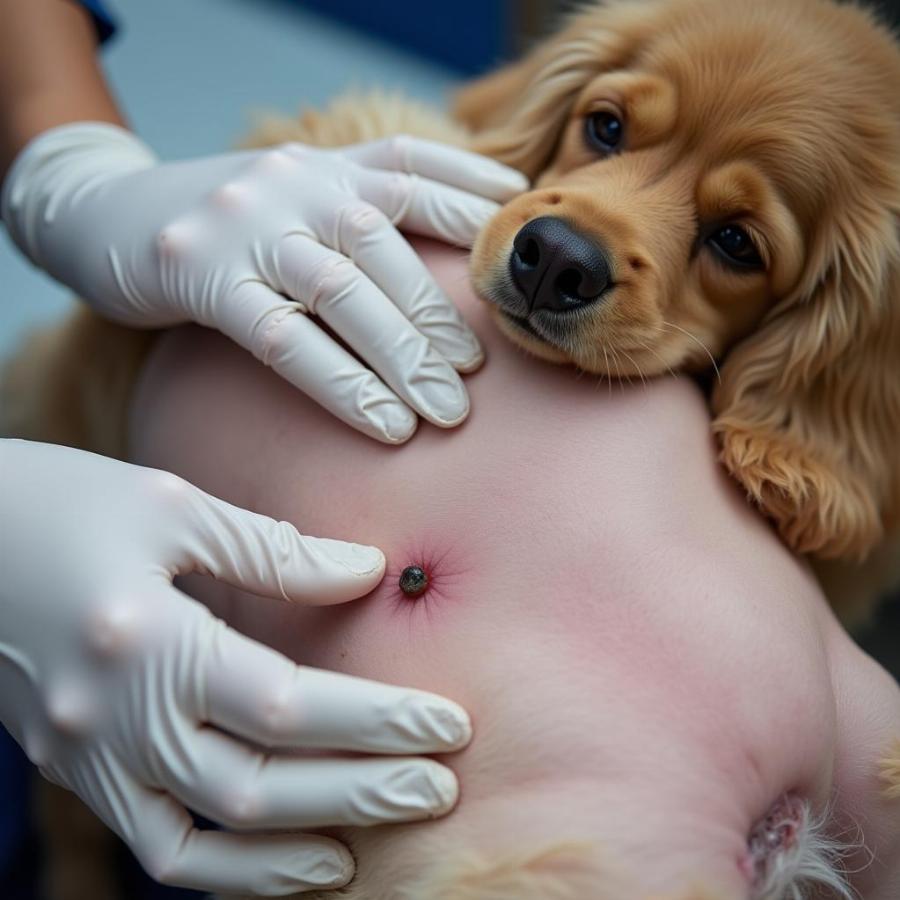Finding a long skin tag dangling from your beloved canine companion can be alarming. While most skin tags are harmless, it’s understandable to worry. This article delves into the common causes of long skin tags on dogs, when to seek veterinary attention, and available treatment options.
What Causes Long Skin Tags on Dogs?
Skin tags, also known as fibropapillomas, are small, benign tumors of the skin. They often appear as flesh-colored or pigmented growths that can be smooth or irregular. While the exact cause of skin tags in dogs is unknown, they are thought to arise from the overgrowth of skin cells and collagen.
Several factors can increase the likelihood of a dog developing skin tags, including:
- Age: Older dogs are more prone to developing skin tags, just like their human counterparts.
- Breed: Certain breeds, such as Cocker Spaniels, Poodles, and Dachshunds, may be genetically predisposed to skin tags.
- Obesity: Overweight dogs may develop skin tags due to hormonal factors and increased skin friction.
- Viral Infections: Some viral infections, such as the papillomavirus, can trigger the development of skin tags.
When to Worry About a Long Skin Tag
Most long skin tags on dogs are benign and don’t require treatment. However, it’s crucial to monitor them for any changes. Contact your veterinarian if you notice any of the following:
- Rapid Growth: If the skin tag grows quickly, it’s essential to rule out any underlying medical conditions.
- Bleeding or Discharge: Bleeding, oozing, or a foul odor from the skin tag can indicate infection or irritation.
- Your Dog’s Discomfort: If the skin tag appears to be bothering your dog, causing them to scratch, lick, or rub the area excessively, it’s best to consult your vet.
Treatment Options for Long Skin Tags on Dogs
In most cases, long skin tags don’t require treatment. Your vet might recommend monitoring the tag for any changes. However, if the skin tag is causing your dog discomfort or poses a health risk, treatment options might include:
- Surgical Removal: This is a quick and straightforward procedure usually performed under local anesthesia.
- Cryosurgery: This technique uses liquid nitrogen to freeze and destroy the skin tag.
- Electrocautery: This method utilizes heat generated by an electric current to remove the skin tag.
“It’s important to avoid attempting to remove a skin tag at home,” warns Dr. Emily Parker, a veterinarian at City Veterinary Hospital. “Attempting home removal can lead to bleeding, infection, and unnecessary pain for your dog.”
 Veterinarian Examining a Dog's Skin
Veterinarian Examining a Dog's Skin
Keeping Your Dog Comfortable
Whether or not the skin tag requires removal, you can take steps to keep your furry friend comfortable:
- Avoid Picking or Scratching: Discourage your dog from licking, biting, or scratching the skin tag to prevent irritation and infection.
- Use a Harness Instead of a Collar: If the skin tag is in an area where a collar might rub, consider switching to a harness to minimize irritation.
- Regular Grooming: Keep the area around the skin tag clean and free of mats and tangles.
Conclusion
Discovering a long skin tag on your dog can be worrisome. However, most skin tags are benign and don’t require treatment. If you notice any changes in the size, shape, color, or if your dog shows signs of discomfort, consult with your veterinarian for proper diagnosis and treatment.
FAQs
Q: Are skin tags contagious to other dogs?
A: While some skin tags can be caused by a virus, most are not contagious to other dogs or humans.
Q: Can diet affect the development of skin tags?
A: A balanced diet and maintaining a healthy weight can help reduce the risk of skin tags.
Q: Can skin tags grow back after removal?
A: While unlikely, skin tags can potentially grow back in the same spot after removal.
Need more information? Check out these related articles:
- pawtree dog food: Learn about high-quality dog food options for maintaining a healthy weight.
- dog waterless shampoo: Discover convenient ways to keep the area around skin tags clean.
About Beaut Dogs
Beaut Dogs is your one-stop resource for all things related to caring for your beloved canine companion. We provide reliable information on dog breeds, health, nutrition, and more. For personalized advice, contact us at [email protected].